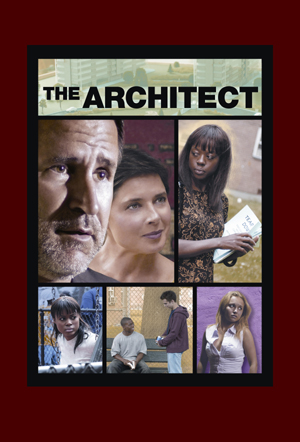
THE ARCHITECT
US, 2006, 82 minutes, Colour.
Anthony La Paglia, Lola Davis, Isabella Rossellini, Sebastian Stan, Hayden Panettiere, Paul James.
Directed by Matt Tauber.
The Architect is based on a play by David Gregg who collaborated with director Matt Tauber on the screenplay. It is set in the Projects in Chicago. The film focuses on Chicago and its architecture – although the film was made in New York City in twenty days.
Anthony La Paglia plays an architect who was responsible for the Projects. However, decades later, the black residents want the Projects torn down since they are destructive of life and lifestyle there. Lola Davis portrays the campaigner.
Meanwhile, the architect has problems at home, the distance of his obsessive wife, Isabella Rossellini; the sexual consciousness and low self-esteem of his fifteen-year-old daughter, Hayden Panettiere, who takes up with a truck driver; and his older son (Sebastian Stan) who has dropped out of school, has a sexual identity crisis and an encounter with a young black man from the Projects (Paul James).
This means that there are a lot of issues in the brief running time. In one sense, the imagery of the architect and his building being destructive to the black residents is symbolic of the destructive nature of the family – and of the young son’s intervention in the life of a black resident in the Projects.
The film is well acted but, in the running time, it has to deal with quite a number of issues.
1.The film based on a play, its brevity? The range of subjects within the brief running time?
2.The title, the visuals of the landscapes, the skylines, the Projects? The architect’s own house?
3.The film as an allegory, race, society, architecture? Black and white relationships? The Projects housing people and not providing houses and homes for people? The consequences? The conditions for good architecture? The exploitation in the Projects, the suicides? The architect and his son?
4.Chicago visuals, the film made in New York City, the buildings, the Project, the plans for the changes?
5.Leo and Anthony LaPaglia?, his job, age, relationship with Julia, twenty years of marriage, his insensitivity to her needs, his picking up Martin from college and bringing him home, his interest and love for Chris, but not understanding her? Taking them to his lecture? Martin and his life at school, the tensions, upsets at home? The campaigner and her coming to the class, discussions with Leo? Coming to his home? The look at the plans, her strong stance? His reactions to her interventions? Julie’s reaction to him, his daughter supporting him? His going to the Projects, his principles of good architecture as delineated in the lecture? Seeing his son on the roof – and the future?
6.The campaigner, her life, the racial background, the loss of her son, at the cemetery? Her daughters? The petition, the reactions of the other residents? Going to the lecture, her talking with Leo, her visit to his house? Her rejection of the model? Her relationship with her daughter, going to see the family she was staying with? The daughters at home? The final answer from the city? The final talk with Leo, his wanting her to affirm him as a good man? Her inability to do this?
7.Chris, at home, her image, looking in the mirror, sexuality, sense of inadequacy? Going to the lecture? Talking to the boys? In the women’s room, the invitation to come to the club, her dressing up, going, the need for ID, being allowed in the club, drinking the beer, the boy and his kissing her, the driver and his concern, giving her a lift, her coming on to him, his reactions, the coffee, the discussions, his wisdom in drawing the line? Dropping her home? The effect on her? At home, listening to her parents quarrelling, her being upset with her mother, her self-centredness? Her going to help Martin when the boy committed suicide?
8.Martin, at home, with his father, the visit to the Projects, the encounter with Shawn, his resisting him, their talking, communicating? The sexual attraction, the encounter, his rejection? His phone number in Shawn’s pocket, going to the body, going back to the Projects? His father arriving? A future?
9.Julia, in the garden, at home, everything in its place, her angry outbursts? The deep disquiet? Her children not listening to her? The long life with her husband, wanting a separation? Her love for her children?
10.Shawn, a boy of the Projects, at the railway stations, the pickups, the encounter with Martin, coming on to him, their spending the time together, his client? The next encounter with Martin, the sexual attraction, his feelings of rejection? Killing himself?
11.The campaigner’s daughter, her studies, the gangs in the Projects, her mother defending her? The tensions in the Projects? Her sisters?
12.The brevity of the film, the brief treatment of all the issues? The characters symbolising issues?